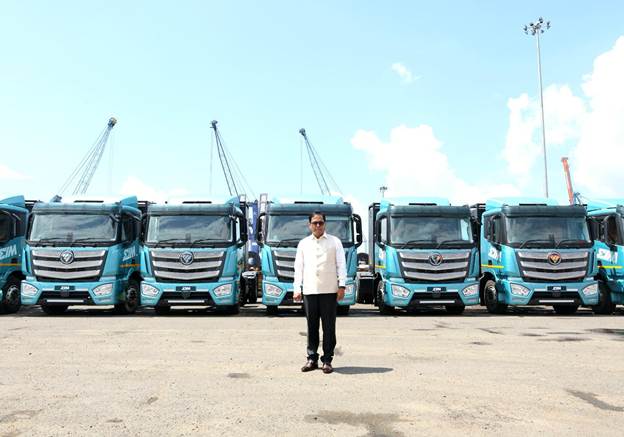With JNPA handling nearly half of India’s container trade, the deployment of EV trucks carries national significance. It reinforces the country’s broader logistics transformation under PM Gati Shakti and the National Logistics Policy.
As one of India’s busiest seaports, Jawaharlal Nehru Port Authority (JNPA) marked a significant milestone in sustainable logistics when Sarbananda Sonowal, Union Minister of Ports, Shipping & Waterways, flagged off the country’s first fleet of electric heavy trucks with swappable batteries at the Nhava Sheva Distribution Terminal on Thursday.
With this induction, JNPA now operates the largest electric vehicle (EV) trucking fleet among Indian ports. A heavy-duty battery swapping station was also commissioned. The port authority aims to convert 90 per cent of its internal heavy truck fleet—approximately 600 vehicles—by December 2026.
In his address, Sonowal said JNPA’s decision to electrify its logistics fleet would serve as a model for other ports. “It sends a message that India’s ports are ready to embrace the future, ready to pioneer practices that will set benchmarks for sustainability, efficiency, and innovation. Across India, ports are introducing solar and wind power projects, LNG and hydrogen fuel infrastructure, and electrification of cargo-handling equipment.”
The deployment of state-of-the-art EV trucks marks a decisive stride in JNPA’s decarbonisation journey. It reflects the port’s commitment to global sustainability goals while enhancing operational efficiency and reducing carbon emissions across cargo corridors. Fifty trucks were flagged off during the event, with the fleet expected to expand to 80 by the year-end.
Sonowal added, “In recent months, JNPA has consistently been in the news for the right reasons—ranking among the top 25 ports globally in the World Bank’s CPPI index, achieving container handling records, and advancing key projects in the SEZ, digitalisation, and green energy.” The EV fleet acquisition, he said, was another jewel in that crown.
Leap Into Cleaner Port Operations
Also speaking on the occasion, Unmesh Sharad Wagh, Chairperson, JNPA and Chairman & Managing Director, Vadhavan Port Logistics Limited (VPLL), said the launch of the EV trucks was more than an incremental upgrade; it was a paradigm shift towards cleaner, greener, and more resilient port operations.
“As custodians of India’s largest container port, it is incumbent upon us to embrace innovation that reconciles economic dynamism with ecological responsibility. This fleet of EV trucks will serve as harbingers of a new era, wherein sustainability is not an adjunct to growth but its very foundation.”
The initiative carries national significance. JNPA, which handles nearly half of India’s container trade, is setting the pace for sustainable logistics. The EV deployment supports India’s broader logistics transformation under PM Gati Shakti and the National Logistics Policy (NLP).
By integrating EV trucks into port operations, JNPA demonstrates alignment with India’s net-zero commitment by 2070 and supports the National Electric Mobility Mission Plan (NEMMP). The initiative showcases commercial-scale EV adoption in high-throughput logistics, reduces operational emissions, curbs particulate pollution and noise, and establishes a replicable benchmark for other ports to follow in cargo-handling and last-mile connectivity.
During the event, a memorandum of understanding (MoU) was also signed between JNPA and the Isaac Centre for Public Policy (ICPP), Ashoka University, Delhi. The MoU aims to create a reference framework for port authorities to determine tariffs using both cost and port benchmarking perspectives across cargo types and commodities.


